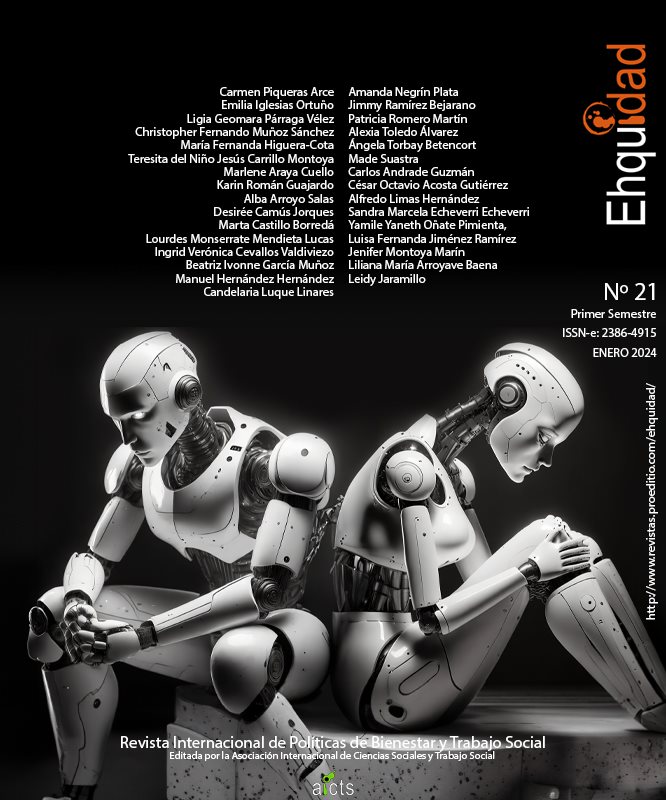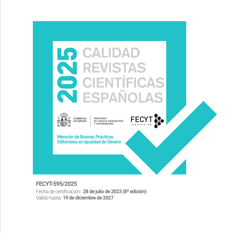La influencia de la significación vital y el apoyo social en la resiliencia en Argentina, Colombia, Indonesia y España
DOI:
https://doi.org/10.15257/ehquidad.2024.0007Palabras clave:
vida significativa, significación vital, apoyo social, resiliencia, bienestarResumen
Uno de los propósitos fundamentales del ser humano es desarrollar una vida plena y significativa. Entre las fuentes principales para lograr esa significación se halla el apoyo social. La significación vital es esencial porque, además, contribuye a conseguir el afrontamiento resiliente de las adversidades que se producen a lo largo de la existencia. Este es un tema de investigación relevante para el Trabajo Social y otras ciencias sociales. 1.500 participantes de Argentina, Colombia, España e Indonesia completaron un cuadernillo con la Medida de Vida Significativa (MLM) de Morgan y Farsides (2009a, 2009b), la Encuesta de Apoyo Social (MOS-SSS) de Sherbourne y Stewart (1991) y la Escala de Resiliencia (CD-RISC) de Connor-Davidson (2003). Las escalas tienen buenas propiedades psicométricas. El análisis factorial encuentra una estructura de cinco factores para la escala de vida significativa y dos factores para la de apoyo social, mientras que la escala de resiliencia se comporta como unifactorial. El modelo estructural muestra que el apoyo social influye tanto en la significación vital como en la resiliencia ante la adversidad. También se observa una influencia directa del apoyo social sobre la resiliencia.
Descargas
Citas
Apriani F. and Arruum Listiyandini R. (2019). Kecerdasan emosi sebagai prediktor resiliensi psikologis pada remaja di panti asuhan. Jurnal Psikologi Indonesia, 8(2), 325-339. https://doi.org/10.30996/persona.v8i2.2248
Battista, J., and Almond, R. (1973). The development of meaning in life. Psychiatry, 36, 409-427. https://doi.org/10.1080/00332747.1973.11023774
Bentler, P. M., and Bonett, D. G. (1980). Significance tests and goodness of fit in the analysis of covariance structures. Psychological bulletin, 88(3), 588. 10.1037/0033-2909.88.3.588
Beutel ME, Brähler E, Wiltink J, Michal M, Klein EM, Jünger C, et al. (2017) Emotional and tangible social support in a German population-based sample: Development and validation of the Brief Social Support Scale (BS6). PLoS ONE 12(10): e0186516. https://doi.org/10.1371/journal.pone.0186516
Chalmers, R. P. (2012). "mirt: A Multidimensional Item Response Theory Package for the R Environment". Journal of Statistical Software. 48 (6): 1–29. 10.18637/jss.v048.i06
Choi, S. W., Gibbons, L. E., and Crane, P. K. (2016). Lordif: logistic ordinal regression differential item functioning using IRT. R Package Version, 3-3. 10.18637/jss.v039.i08
Connor, K. and Davidson, J. (2003). Development of a new resilience scale: The Connor?Davidson Resilience Scale (CD?RISC). Depression and Anxiety, 18:76–82. 10.1002/da.10113
Costa, G., Salamero, M. and Gil, F. (2007). Validación del cuestionario MOS-SSS de apoyo social en pacientes con cáncer. Medicina Clínica, 128 (18), 687-691. 10.1157/13102357
Crumbaugh, J., and Maholick, L. (1969). Manual de instrucciones para el Test de Sentido de Vida (PIL). Saratoga: Viktor Frankl Institute for Logotherapy.
Delle Fave, A., Brdar, I., Freire, T., Vella-Brodrick, D. and Wissing, M. (2011). The Eudaimonic and Hedonic Components of Happiness: Qualitative and Quantitative Findings. Social Indicators Research, 100: 185–207. 10.1007/s11205-010-9632-5.
Di Fabio, A. (2014). Meaningful Life Measure: primo contributo alla validazione della versione italiana [Meaningful Life Measure: First Contribution to the Validation of the Italian Version]. Counsel. Giornale Italiano Ricerca Appl. 7, 307–315. http://hdl.handle.net/2158/938535
Du, H.; Li, X.; Chi, P.; Zhao, J.; and Zhao, G. (2017). Meaning in life, resilience, and psychological well-being among children affected by parental HIV. Aids Care, 29, 11, 1410–1416. 10.1080/09540121.2017.1307923.
García-León, M. A.; González-Gómez, A.; Robles-Ortega, H.; Padilla, J.L. y Peralta-Ramírez, M.I. (2019). Propiedades psicométricas de la Escala de Resiliencia de Connor y Davidson (CD-RISC) en población española. Anales de Psicología / Annals of Psychology. vol. 35, nº 1 (january), 33-40. https://doi.org/10.6018/analesps.35.1.314111.
Gras, M.E.; Font-Mayolas, S.; Baltasar, A. Patiño, J.; Sullman, M. and Planes, M. (2019). The Connor-Davidson Resilience Scale (CD-RISC) amongst Young Spanish Adults. Clínica y Salud. 30(2) 73-79. https://doi.org/10.5093/clysa2019a11.
Hernández, J and Betancort, M (2016). ULLRToolbox. http://sites.google.com/site/ullrtoolbox/.
Hochberg, Y. (1988). A sharper Bonferroni procedure for multiple tests of significance. Biometrika, 75, 800–803. 10.2307/2336325.
Horton, T.V. and Wallander, J. L. (2001). Hope and Social Support as Resilience Factors Against Psychological Distress of Mothers Who Care for Children With Chronic Physical Conditions. Rehabilitation Psychology, 46, 4, 382-399. https://doi.org/10.1037/0090-
46.4.382.
Hu, L. and Bentler, P. (1995). Evaluating model fit. In R.H. Hoyle (Ed). Structural equation modeling: Concepts, issues, and applications. Thousand Oaks, CA, US: Sage Publications, 76-99.
Kleftaras, G. and Psarra, E. (2012). Meaning in Life, Psychological Well-Being and Depressive Symptomatology: A Comparative Study. Psychology, 3, 4, 337-345. 10.4236/psych.2012.34048.
Kline, R. (2011). Convergence of structural equation modeling and multilevel modeling. In M. Williams (Ed.), Handbook of methodological innovation. Thousand Oaks, CA: Sage. http://dx.doi.org/10.4135/9781446268261.n31
Li, F. et al. (2021). Effects of sources of social support and resilience on the mental health of different age groups during the COVID-19 pandemic. BMC Psychiatry 21:16 https://doi.org/10.1186/s12888-020-03012-1
Liu, Y.; Di, S.; Shi, Y. and Ma, C. (2022). Meaning in life and adolescent self-control: Effect of perceived social support and its gender differences Frontiers in Psychology. 13 https://doi.org/10.3389/fpsyg.2022.1087668
Lozano Díaz, A., Fernández-Prados, J.S., Figueredo Canosa, V. y Martínez Martínez, A.M. (2020). Impactos del confinamiento por el COVID-19 entre universitarios: Satisfacción Vital, Resiliencia y Capital Social Online. International Journal of Sociology of Education, Special Issue: COVID-19. Crisis and SocioeducativenInequalities and Strategies to Overcome them, 79-
nhttp://doi.org/10.17583/rise.2020.5925.
Machielse, A. (2018). Social isolation, meaning-in-life, and resilience. Innovation in Aging, 2, Issue suppl_1, 25. 10.1093/geroni/igy023.093
Malçoc, A. and Yalçin, I. (2015). Relationships among Resilience, Social Support, Coping, and Psychological Well-Being among University Students. Turkish Psychological Counseling and Guidance Journal, 5 (43) 35-43. 10.17066/PDRD.22119
Marti?nez, A. E., Sa?nchez, S., Aguilar, E. J. y Rodri?guez, V. (2014). Adaptación y validación del cuestionario MOS de Apoyo Social en pacientes mejicanos con VIH. Revista Latinoamericana de Medicina Conductual. 4, 2, 93-101. https://www.redalyc.org/articulo.oa?id=283043156006
Morgan, J. and Farsides, T. (2009a). Measuring Meaning in Life. Journal of Happiness Studies, 10:197–214. 10.1007/s10902-007-9075-0.
Morgan, J., and Farsides, T. (2009b). Psychometric evaluation of the meaning in life measure. Journal of Happiness Studies, 10, 351–366. 10.1007/s10902-008-9093-6.
Morgan, J., and Robinson, O. (2012). Intrinsic Aspirations and Personal Meaning Across Adulthood: Conceptual Interrelations and Age/Sex Differences. Developmental Psychology. Advance online publication. 10.1037/a0029237.
Muñiz, J., Elosua, P. and Hambleton, R. K. (2013). Directrices para la traducción y adaptación de los tests: segunda edición. Psicothema, 25, 2, 151-157. 10.7334/psicothema2013.24.
Newsom, J. T. (2015). Longitudinal structural equation modeling: A comprehensive introduction. Routledge.
Revelle, W. (2019) psych: Procedures for Personality and Psychological Research, Northwestern University, Evanston, Illinois, USA, https://CRAN.R-project.org/package=psych. Version = 1.9.12.
R Core Team (2016). R: A language and environment for statistical computing. Vienna, Austria. R Foundation for Statistical Computing.
Rosseel, Y. (2012). lavaan: An R Package for Structural Equation Modeling. Journal of Statistical Software, 48(2), 1-36. 10.18637/jss.v048.i02.
Ryff, C. D. (1989). Happiness is everything, or is it? Explorations of on the meaning of psychological wellbeing. Journal of Personality and Social Psychology, 57, 1069-1081. 10.1037/0022-3514.57.6.1069.
Schmid, J., and Leiman, J. M. (1957). The development of hierarchical factor solutions. Psychometrika, 22(1), 53-61. 10.1007/BF02289209.
Sherbourne, C. D. and Stewart, A. L. (1991). The MOS Social Support Survey. Social Science and Medicine, 32 (6),705-714. 10.1016/0277-9536(91)90150-b.
Southwick and Charney (2018) «Perfiles de Resiliencia», In N. E. Kuarez, Munist, M., Kotliarenco, M. A. (Eds.), Resiliencia tendencias y perspectivas. Argentina: Fundación Bernard van Leer. UNLA.
Tsibidaki, A. (2021). Anxiety, meaning in life, self-efficacy and resilience in families with one or more members with special educational needs and disability during COVID-19 pandemic in Greece. Research in Developmental Disabilities. 109, 103830
Vaziri, S., and Lotfi, A. A. (2017). Contributing allocation of meaning of life and perceived social support in coping with the pain. Developmental psychology (Journal of Iranian Psychologists), 13 , 52; 375-382. https://www.sid.ir/en/journal/ViewPaper.aspx?id=549960.
Wang, Z., and Xu, J. (2017) Association Between Resilience and Quality of Life in Wenchuan Earthquake Shidu Parents: The Mediating Role of Social Support. Community Mental Health Journal 53.7: 859-63. 10.1007/s10597-017-0099-6.
Weathers, L. N., Aiena, B. J., Blackwell, M. A. and Schulenberg, S. E. (2016). The signi?cance of meaning to conceptualizations of resilience and posttraumatic growth. In P. Russo-Netzer, S. E. Schulenberg, and A. Batthyany (Eds.), Clinical perspectives on meaning: Positive and existential psychotherapy (149–169). Springer International Publishing AG. https://doi.org/10.1007/978-3-319-41397-6_8
Weber, M. C., Pavlacic, J. M., Gawlik, E. A., Schulenberg, S. E., and Buchanan, E. M. (2020). Modeling resilience, meaning in life, posttraumatic growth, and disaster preparedness with two samples of tornado survivors. Traumatology, 26(3), 266–277. https://doi.org/10.1037/trm0000210
Zhang, L., Jiang, M., Wang, L., Zheng, J. and Wang, W. (2023). The Mediating Effect of Perceived Social Support and Medical Coping Modes Between Psychological Resilience and Meaning in Life in COVID-19 Patients. Patient Preference and Adherence. 17, 571 -582.













